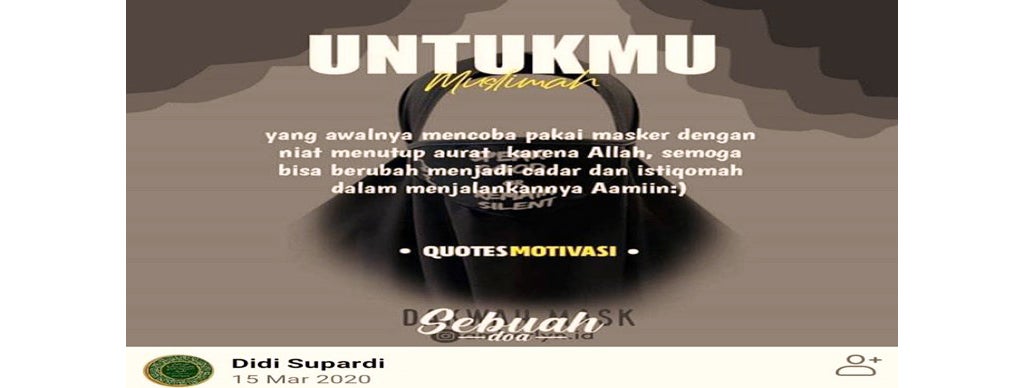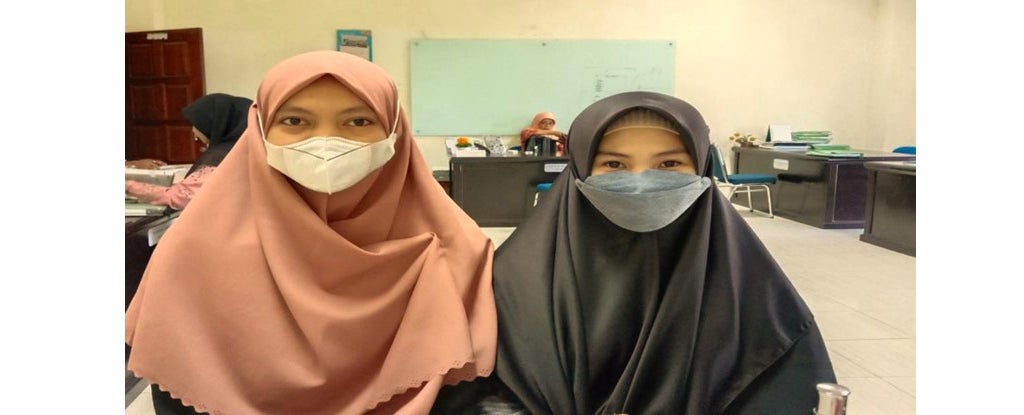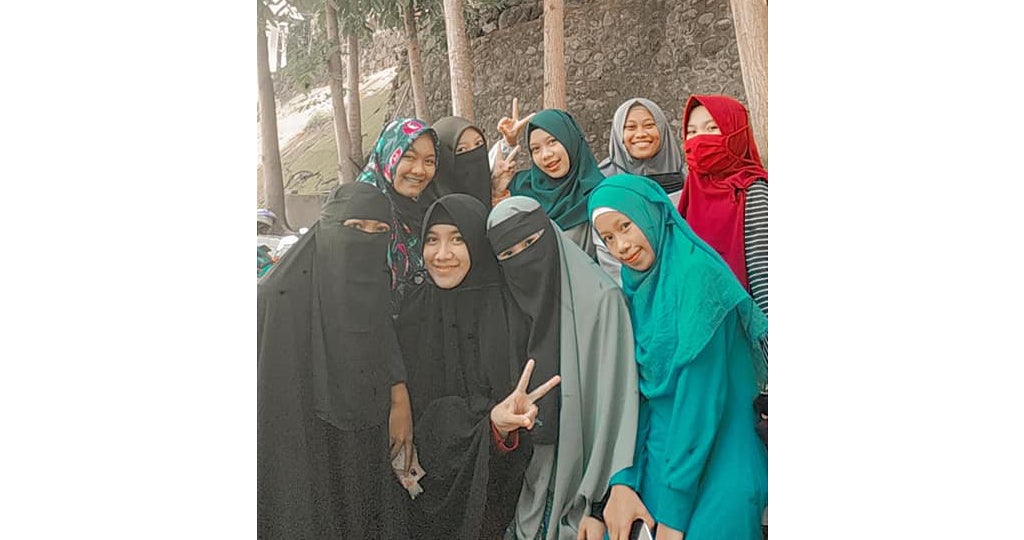From Mask to Cadar: The New Interpretation of Islamic Values During COVID-19 in Indonesia
contributed by Almunauwar Bin Rusli, translated from Bahasa Indonesia by Erica M. Larson, 22 March 2022
Responses to COVID-19 in Indonesia have led not only to adopting new disease-mitigating measures like wearing masks, but also to integrating these measures into understandings of religious practice for young women who are influenced by Salafi movements.
Many previous studies have focused primarily on COVID-19 and the use of public health as a rational basis for the government’s implementation of social distancing measures targeting communal and religious rituals. For example, one study has focused on the ways in which COVID-19 has created Islamic polarization. The Islamic Defenders Front (Front Pembela Islam- FPI), led by Habib Rizieq Shihab, for example, vehemently rejects the government policies because they have unilaterally restricted Muslims from performing worship in mosques during Ramadan and Eid al-Fitr, and prevent Indonesians from undertaking a pilgrimage to Mecca. A demonstration involving crowds of FPI supporters protested against a bill (RUU Haluan Ideologi Pancasila) which was intended to strengthen the position of the national ideology Pancasila, based on their rationale that it introduced communist influences. In this article, I take a different approach, investigating a religious phenomenon which has emerged as a consequence of COVID-19. Rather than resistance, this incident has led to collaboration with regard to ways of being religious in the modern world.
How did Masks Turn into Cadar ?
It is possible that COVID-19 has actually been able to shift the understanding of faith and model of selfhood of Indonesian Muslim women. During COVID-19, Muslim women who wear the jilbab (veil) have also started consistently wearing a mask on part of their faces. In doing so, they show their respect for state policies and public health directives. After passing through the phases of Large-Scale Social Restrictions (PSBB- Pembatasan Sosial Berskala Besar) and the Enforcement of Restrictions on Community Activities (PPKM- Pemberlakuan Pembatasan Kegiatan Masyarakat), mask wearing has become a habit and part of the individual’s habitus. Bourdieu describes habitus not as natural, but as the result of the internalization of cultural values from outside of the individual, done repeatedly such that they become a habit.
The position of masks as a new habitus during the COVID-19 era became a point of focus among young women studying at Islamic universities as well as the organization Wadah Islamiyah (WI), linked to Salafi interpretations of Islam, including the doctrine of Islamism. In modern times, Salafism is linked to schools of thought which seek to purify teachings brought by the Prophet and literal interpretations of the Qur’an, separating them from that which is considered bid’ah (innovations outside of traditional Muslim practice), khurafat (superstitions), or syirik (polytheism). WI is an Islamic community organization originating in South Sulawesi, and was one of the earliest Salafi organizations in Indonesia, founded on 18 June 1988 under the name Yayasan Fathul Muin (YFM).
Several female Muslim students who follow this organization have decided to stop wearing masks and start wearing the cadar (Islamic face-covering). They argue that this world represents Daar Al-Bala, the place where humans are tested. Trials in life sometimes appear in the form of enjoyment, whereas others appear in the form of calamity. This is found in Surah Al-Anbiya [21]:35, which reads: “Every soul will taste death. And We test you with evil and with good as trial; and to Us you will be returned.” For Wadah Islamiyah, the command to wear the hijab (veil) and cadar (face-covering) are understood as written in the Qur’an in Surah Al-Ahzab[33]:59, as follows: “O Prophet, tell your wives and your daughters and the women of the believers to bring down over themselves [part] of their outer garments. That is more suitable that they will be known and not be abused. And ever is Allah Forgiving and Merciful.”
The influence of Wadah Islamiyah can be said to be quite successful in changing the habits and personhood of Muslim women. They promote an ethical perspective related to ‘post-materialism,’ or returning to physical and bodily aspects as the most important in the spiritual and metaphysical. Among Muslim young women who are actively seeking out a Muslim identity, many have been whole-hearted in their attempt to ‘perfect’ their masks by turning them into cadar to seek God’s satisfaction while simultaneously protecting their body from slander. I consider that this paradigm shift has been significantly influenced by Islamic doctrines popular on social media websites, including Twitter, YouTube, and Facebook.
Research results from the Center for the Study of Islam and Society- Pusat Pengkajian Islam dan Masyarakat (PPIM) at State Islamic University Syarif Hidayatullah in Jakarta show that conservative religious narratives are the most prevalent in cyberspace, dominating 67.2% of the discussions. Moderate narratives represent 22.2%, liberal narratives 6.1%, and Islamist narratives 4.5%. Conservative understandings of Islam in general are often promoted relative to gendered concerns and related to good and bad practices. The narrative directs girls toward becoming good children, and women toward becoming good wives and mothers. They reject a secular perspective on gender. This research also shows that women are more likely to be exposed to conservative religious interpretations online compared to men. Wadah Islamiyah’s dakwah (referring to a focus on deepening faith or proselytizing) posts on Indonesian social media, including Facebook, also follow these trends.

Figure 1. Facebook Meme reads: “China is busy wearing masks, but Allah (glorious and exalted is he) already prepared cadar masks thousands of years ago. Smart Islam!”. Source : https://www.facebook.com/gantenge.ketuju

Figure 2. Facebook post reads: “For you, Muslim women, who first tried to wear a mask to cover yourselves because of Allah, hopefully it can turn into a cadar, remaining steadfast in doing it, Amen :)”. Source : https://www.facebook.com/didi.supardi.35574406
The Rise of Salafi Rationality
I argue that the shift from a culture of mask-wearing to donning the cadar as a result of COVID-19 in Indonesia has not only given rise to a post-materialist view, but also one of Salafi rationality. This perspective is demontrated by two Muslim women whom I met at the State Islamic Institute of Higher Education (PTKIN- Perguruan Tinggi Keagamaan Islam Negeri): Cindra from Bolaang Mongondow and Nawirna from Gorontalo. First, they interpret COVID-19 as God’s command to become more faithful by studying Islam in the private sphere, due to the requirements of social distancing. Second, they rationalize Islamic teachings as returning to basic Salafi practices, such as wearing the cadar. Third, just as a person must wear a mask and not shake hands to remain safe from the spread of the virus, a Muslim woman must, in the name of religious purity, wear a cadar as well as refuse to touch hands with those who are not close family members. Fourth, the context of COVID-19 demonstrates the cadar not as a symbol of violence but as a symbol of physical and psychological health. The rise of Salafi rationality is seen as increasing the superiority of Islam in state educational institutions in Indonesia, as students gain confidence and dismiss Western stereotypes.

Figure 3. Expressions of Indonesian Muslim women: Cindra and Nawirna wearing masks on their university campus. Source: Author

Figure 4. Cindra and Nawirna with friends after having replaced their masks with cadar. Source: Author
From here, we can see the students’ shifting interpretations as they are both influenced by the Salafi movement. This mindset has also encouraged them toward self-dialogue, dialogue with God, as well as considerations about death. Cindra and Nawirna, who are university students at the State Islamic Institute of Manado (IAIN Manado) acknowledge that they have received reinforcement of this discourse from Wadah Islamiyah in North Sulawesi. This reinforcement occurs through closed Qur’anic recitation sessions, dakwah posters on Instagram and Facebook, and even in the context of closed WhatsApp groups. The process of switching from wearing the mask to wearing the cadar is influenced by the communicative action taking place in these various contexts.
There are four modes of communicative action which have been implemented by Wadah Islamiyah during COVID-19. First, there are truth claims, which are agreements about the natural and objective world. Second, there are claims of rightness, or agreements about the implementation of norms in the social world. Third, there are claims of sincerity, which are agreements about the compatibility of one’s inner state with outward expression. Fourth, there are comprehensibility claims regarding the ability to explain the previous types of claims and to reach an agreement about them.
In closing, the COVID-19 pandemic has succeeded in turning the cadar into a symbol which is no longer feared. This change is linked to the interpretation of Islamic teachings built up in the public sphere, related to both post-materialism and Salafi rationality. I predict that this interpretation will continue to have a lasting impact in contemporary Indonesian Muslim society.
Disclaimer: The views and opinions expressed in this article are those of the authors and do not necessarily reflect the position of the blog editorial team or the Asia Research Institute.
South Asia | Southeast Asia | East Asia | Other Places | Hinduism | Buddhism | Islam | Christianity | Other Religions
Almunawar Bin Rusli (almunauwar.binrusli@iain-manado.ac.id) is a lecturer in Islamic Studies at the State Islamic Institute (IAIN- Institut Agama Islam Negeri) of Manado, North Sulawesi (Indonesia). He has also been a Research Fellow in the field of Religious Beliefs and Freedom at the Center for Religious and Cross Cultural Studies (CRCS), Gadjah Mada University.

